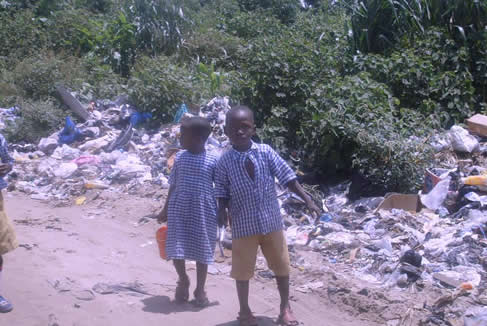The status of Lagos as the commercial
nerve centre of Nigeria and its inevitable population increase in has led to
the corresponding demand for shelter in the State. As a result, this many
residents are moving to peri-urban areas in the State such as Oribanwa and its
environs. As a result of its closeness to Victoria Island, low cost houses are
springing up in the community. Despite the rapid development, the roads
are bad, often water logged, there are no drainages and many of the houses in
the area have no toilets and the people lack access to adequate sanitary
facilities. Most of the residents have resorted to defecating in nearby bushes,
in uninhabited buildings and empty land areas. This has become a source
of great concern to the residents. It was also observed that refuse and
human waste are directly dumped into waste dumps or make shift gullies on a
daily basis.
This prompted the visit to Oribanwa.
The ELRI team compromising: Bunmi Moses, Ebere Akwuebu, Feyi Awe, Tolu
Akintimehin and Adeola Okesiji arrive Oribanwa and were amiably received by Mr.
Ramon Onilewaji a representative of the youths in the community. Mr. Ramon took
the team to the residence of Chief Rasak Onilewaju, one of the community
leaders; from where they were ushered into the Baale’s palace.
At the palace, the team was received
by the Baale, Chief .Y. Adenowo, his head Chief Rasak Onilewaji, Mr. Ramon and
Mr. Saidi Onilewaji the Community Development Association secretary.
After a brief introduction of ELRI,
the programme manager for ELRI, Ms Moses, explained the visit was part of the
organizations community environmental and sanitation awareness raising activities.
She gave a brief overview of the importance of good sanitation and
environmental protection in the overall well-being of the community,
highlighting the potential diseases associated with poor sanitation. She
went on to outline the team’s observation during their tour of the Oribanwa
community.
The team highlighted the interactions
between environment, sanitation, hygiene and water supply. They concluded by
expressing the organization’s intention to work with the community to enhance
its sanitation facilities.
The head chief thanked the team for
the visit and offer of support. He stated that indeed that most of the houses
in community had no toilets and the indigenes had to resort to defecating in
the nearby bushes or surrounding open lands a situation which leaves such areas
polluted with the stench of human waste. The Chief told the delegates of an
incident which occurred not too long ago in the community wherein as a result
of the lack of toilets in the schools in the community some female secondary
school students had gone to the nearby bushes to relief themselves but were
attacked and raped by some miscreants.
According to him, the community had
two sources of water supply, a small stream which was always drying up or being
polluted with human and animal faeces and the bore-hole. The borehole was said
to have been constructed eight (8) years ago by the State government. When Ms
Moses enquired why the community was unable to refurbish the dilapidated
borehole project the Baale responded that their communal effort had been
stalled by local government authority who assured them that the State
Government had already made provisions for the repair of the borehole. The only
feasible effort at repairs on the borehole appears to be that of the Nigerian Rotary
Club (ROTARY).
The community leaders further pointed
out that the only waste disposal system in the community was the refuse dump
site located at Lakwue village which entailed indiscriminate dumping of refuse
at the roadside. At the time of the visit this improvised refuse dump was
overflowing to the road and nearly blocking the narrow road leading from
Oribanwa and Lakuwe. Infact, pupils from nearby schools were seen passing
through this refuse site as access their home, a situation which invariably may
constitute adverse health implications to these children.
It was agreed at the end of the meeting that
the community leaders hold meetings with other representatives as to how they
could partner with ELRI towards providing the outlined amenities in order to
promote environmental health and safety

